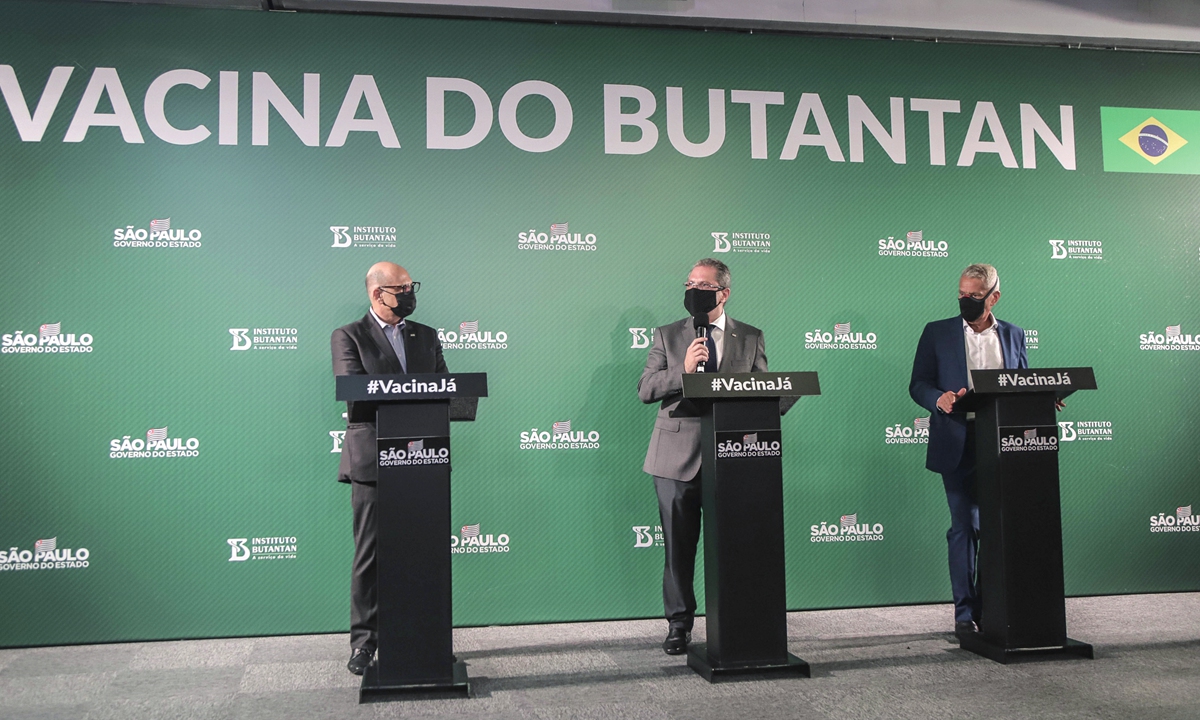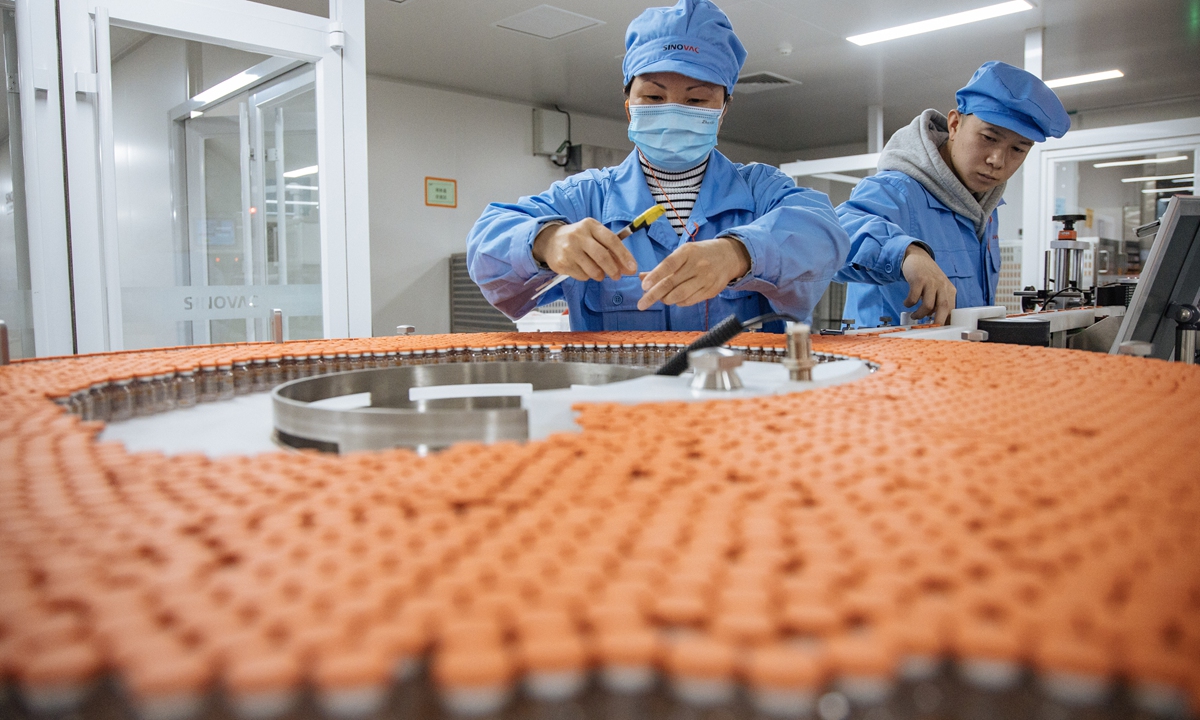Sinovac may further optimize its vaccines before releasing efficacy data
By Wan Lin, Liu Caiyu and Hu Yuwei Source: Global Times Published: 2020/12/24 13:59:22

The Government of Sao Paulo state and Butantan Institute hold a press conference on Wednesday, announcing that the COVID-19 vaccine developed by China's Sinovac is effective. Photo: Xinhua
Sinovac Biotech Ltd may further optimize its vaccines in late-stage clinical trials and release efficacy data along with results obtained from Indonesia and Turkey in 15 days to meet the increasing international demand for its vaccines, Chinese experts said on Thursday, after Brazil postponed the release of detailed data on the effectiveness of the vaccines the company co-developed with the Sao Paulo-based Butantan Institute.
"The phase III study showed that the vaccine is effective. We have reached the threshold of efficacy [50 percent] that allows the process of requesting emergency use, whether in Brazil or in China," Dimas Covas, director of the Butantan Institute, said during a news conference on Wednesday.
Media reports said that Sinovac Biotech Ltd is likely to release data on late-stage trials along with results obtained from Indonesia and Turkey in January as the company needs another 15 days to analyze the data.
Tao Lina, a Shanghai-based expert on vaccines and previous employee of the Shanghai disease prevention and control department, believes the postponement in Brazil may hint that its efficacy rate against the virus is not as high as people expected.
Tao said the vaccines will show no more than 70 percent efficacy. If the protection rate had reached 90 percent, there is no reason why Sinovac should not release such good news immediately.

Quality inspectors on Sinovac vaccine production lines use digital technology platforms to monitor the quality and efficiency of vaccine packaging. Photos: Li Hao/GT
It is within expectations that inactivated COVID-19 vaccines have a lower protection rate than mRNA vaccines, but their safety and adaptability to cold-chain transportation are obviously better than mRNA vaccines, Tao said.
Media reports indicate that mRNA vaccines have the highest protection rate of 95 percent among all the vaccines to have entered phase III clinical trials, according to data released by pharmaceutical companies.
A Beijing-based immunologist told the Global Times on condition of anonymity on Thursday that it is likely that data on the trial results may still need to be refined as there are many indicators for phase III trials that need to be double checked.
The expert believes that another 15 days will be enough to verify and analyze the data, even though Sinovac has not released any details so it is not known how much work is involved.
It is reasonable to consolidate results from other trials of the vaccine, he said, noting that it makes sense that Sinovac would adjust their overall plan to take different circumstances into account, as the vaccine will be used all over the world.
One possible reason for analyzing the data along with results from trials in other countries is that the company might want a larger sample size to improve and refine the results. It is possible that some of the indicators in the Brazil trials may not have met the intended study target. Therefore, it might adjust the design to solve these technical issues, said the expert.
He noted that another possible concern for Sinovac is that the current result might not be able to show its own advantage compared with that of other vaccines, in terms efficiency rate, adverse reactions or other indicators. So it might need further optimization.
China's slowdowns in phase III data disclosure are impacted by all of its most critical phase III clinical trials having to be conducted overseas, and the process has been fraught with difficulties and twists and turns, industry insiders told the Global Times.
"The progress of overseas clinical trials is completely controlled by the team in the host country, and communication at each step requires switching between at least three languages, which creates barriers to efficient communication," a source close to Sinovac told the Global Times. While US pharma giants have demonstrated more extensive resource organization and coordination capacity in its late-stage trials, a Chinese health official said at a press conference on Monday that some Chinese vaccine manufacturers have exposed the shortcomings of their experiences in international cooperation, which partly dragged down the speed. Up until R&D of the COVID-19 vaccines, the vast majority of Chinese vaccine manufacturers focused on the needs of the domestic market.
Sinovac's data from its Brazil trials has attracted worldwide attention. Observers said the release of the data will help increase public recognition of the safety and effectiveness of China's vaccines and increase overseas willingness to approve Chinese vaccines.
It is expected that Brazil, Indonesia, Singapore and Turkey will use the Sinovac vaccines in their national vaccination programs, media reports said. The Global Times learned that some 28,300 volunteers were enrolled in phase III trials in Brazil, Indonesia, Turkey and Chile.
Another Chinese-developed inactivated COVID-19 vaccine developed by Sinopharm has shown 86 percent efficacy against the virus, based on the interim analysis of phase III clinical trials in the United Arab Emirates.
China's national COVID-19 vaccines administration guidelines issued on August 14 require a vaccine protection rate of at least 70 percent and no lower than 50 percent if they request official registration, the same as the standard as the US Food and Drug Administration.
Posted in: SOCIETY